
It seemed to him that if he would only speak, the living past,
the voices of lost men, the pain, the pride, the madness and
despair, the million scenes and faces of the buried life…all
that the old man had seen, would be revealed to him, would be
delivered to him like a priceless treasure…
“It was so long ago,” the old man said.
—Thomas Wolfe
_____________
I didn’t think much of it, one way or the other, when my friend “David” called me one day a few weeks back. He was wondering, he said. Could I pick him up next Saturday and take him over to some friends that needed to sign and notarize some documents? Not unusual from him, such a request. David prepares tax returns, and I’ve taken him on many little trips like that over the years. Including my very first excursion to the deep south end of the county a few years ago. Besides being a licensed attorney, I’m a notary, too. So I come in pretty handy now and then, when such a thing is needed. Sure, I told him when he called. Next Saturday afternoon will work for me. I’ll stop in for coffee around 2:30 or so. And we’ll go from there.
And that’s what we did. I stopped by around my usual time, and we just sat around and talked about things. It’s a comfortable and welcoming place, David’s house. I’ve been going there for years. He got his papers around, then, the ones that needed signing. And off we went, down the road. It wasn’t that far, and soon we pulled into the little Amish farm that was our destination. An older couple lived there, along with one of their unmarried daughters. And today, another daughter would be there, too, a married daughter from out of the area. We stepped out and approached the house. Beautiful sunny Saturday afternoon, is what it was. A gaggle of small children played in the front yard and on the porch. “Is your grandpa home?” David asked. The children turned and looked out across the road, to a rather dilapidated old barn sitting there. And I saw him coming, the patriarch of the place. Large straw hat, galluses, long beard, and gloriously barefoot. Totally comfortable with himself. And we stepped into the house, and were welcomed into the kitchen by the matriarch and her two daughters.
We were seated at the table, and we spread out the papers that needed signing. I got my notary stamps from my briefcase, and we waited. Where was the old man? “Well, maybe we should send someone out to find him,” the goodwife fussed. No, no, I said. I saw him walking in. He’ll be here shortly. And a minute or so later, he stepped into the kitchen. Hatless now, but still barefoot. He’d been around, looked like. Tough and hard nosed with a full head of unruly reddish gray hair and a long gray beard. You could see he’d been knocked around good a good deal, that he’d seen things. And you could see all that knocking around never fazed him one bit, too. He joined us at the table and took a chair. He hardly glanced at me, an English intruder. They signed the papers, then, and I got busy with my stamp and signature. The old man leaned back and he and David visited. Well, mostly David listened while the old man talked. I have no idea how the subject came up, but he just went off all of a sudden, talking about butchering. And the stories rolled right out of him.
“Yep, the most I ever got done was four steers in one afternoon,” he said. “I butchered them by myself. Skinned them out, dressed and cut them up. That was a lot to get done, in one afternoon like that.” Well, he didn’t exactly use those last words. But that’s what he was telling us. And I was impressed. Talk about a hard day’s work, in half a day.
“Well, didn’t you use to work in a butcher shop?” David prompted the man. “You probably learned some tricks about how to do it, there.”
“Yes, yes I did.” The old man replied. “Back in such and such a year (I can’t remember when, but it happened when he was young), I worked at (I forget the name) Butcher Shop.” And that set him off down another little trail. “You know, back then, we ate the whole hog. The best meat is in the head. We’d throw the whole head into a pot of hot water and let it cook. When it was done, we took it out, and knocked it on the counter, and all this good meat just fell out. It was all was ready to eat, right there. And it was all good eating. I always say, they throw the best parts of the hog away, these days, because they don’t want to take the time to get it out. It’s the best part of any hog, what’s in the head.”
And I couldn’t contain myself. He was talking to David, not me. But I interrupted. That all sounds absolutely delicious, I said. He glanced my way. “And the very best piece of meat in the head, it’s just a little chunk, stuck way up in there, in a little hollow place in the skull,” he said. “Most people don’t even know it’s there. You have to knock the skull just right, to get it loose. Sometimes you have to reach up in there and feel for it, to find it. And that little round piece (he held up his thumb and forefinger, a few inches apart), that little round piece of meat is the tastiest part of the whole hog.” When someone like that is telling you something like that, you don’t doubt it. You listen, and you hear. And maybe, just maybe, you speak. It sounds absolutely delicious, I said again.
We wrapped it up, then, and David and I took off for the next stop. And I got to thinking about what the old man had told us. We never ate the whole hog’s head, back when I was a child. But we ate a lot of parts of an animal that most people wouldn’t think were fit to eat today.
I remember way back, before I even started school, when I was three or four years old. And how we’d have a butchering day every fall, sometime in November, I think it was. Could have been late October, too, maybe. The neighbors came by early that morning, after the chores were done. And Dad had fetched the old scalding tank that everyone in the community used. A homemade scalding tank, half round, made of heavy galvanized steel. And both half round ends were made of wood. Dad set the tank up and filled it with water and lit the fire a long time before anyone came. And then after breakfast, the water was pretty much boiling. After breakfast was right at daybreak, cloudy, usually, at that time of year. And cold, too. I never remember this scene in any sunlight. The men all gathered around, outside. And then the victim, a fatted hog, was released from the barn and nudged over to the general area of the tank. Someone stood there with a .22 rifle. Stepped up right close, and took careful aim. A spiteful crack, and the pig just rolled over like it had been pole-axed. And then things got real busy, real quick. I stood off to the side and just watched.
The men dragged the carcass up to the tank, where the water was boiling. Two chains had been strung through the tank, down on the rounded floor and out both sides. They then grabbed the carcass by all four legs and heaved it in, careful not to splash too much. Two men then stood on each side of the tank and grabbed the chains the hog was now resting on. And back and forth they pulled, rolling the hog in the boiling water. Back and forth and back and forth. All the hair and bristle had to come off. After the hog’s skin was smooth and soft and clean as a baby’s, then they lifted it out. Then it was hung up and scraped with sharp knives. And only then was it gutted and dressed out. That’s how you scald a hog carcass. At least that’s how I saw them doing it.
Children will always play at what they see, and we did. I remember one day we devised the game of “Butchering” in the living room. I can’t remember who all was involved, my siblings or friends. Probably both. Anyway, one of us was the “pig,” down on all fours, grunting and snorting along, head to the floor. A few others hovered off to the side, tending to the boiling water in the imaginary scalding tank. And one person stood in front of the pig, pointing a little stick as a gun. The pig snuffled along, completely oblivious, until the person with the gun took careful aim, as we’d seen it done, then shouted, “Bang!” And the pig rolled over, instantly lifeless. Everyone swarmed in and dragged the “carcass” over to the spot where the “tank” was. They then rolled the pig around on the floor, as in scalding. It was all quite merry and exciting, until Mom happened to walk by and saw us playing. She seemed rather horrified.
“Oh, my. No, no. You can’t play that you’re shooting someone,” she chided. But it’s OK, Mom, I said. I’m a pig. Sadly, she did not seem to grasp the concept, and so the butchering game was shut down. And we didn’t play it again, because we were told not to.
It wasn’t until a few years later that I actually remember the tastes and smells of butchering day. After I started school. And things were bustling, when we left on such a morning. The neighbors came. But off we went, to school. That’s where we had to go that day, so we went. And all day, our thoughts drifted back to home, where we knew exciting things were going on. School let out at three. And we rushed home, to see what all had happened.
By then, things were winding down. The meat had been cut up in the washhouse. And Mom and my sisters and the neighbor women had stuffed much of it in glass jars. The pressure cooker sat humming on the kitchen stove, sealing glass jars packed with meat. The guts of the hog had been scraped and cleaned, and they were stuffing sausages and coiling them in large stainless steel mixing bowls. Dad would smoke those with hickory wood, later. There never was any better smoked sausage anywhere than that. And Mom’s large cast iron skillet sat on the hot stove, too, fresh sausage patties simmering in their own juices. I can still see it, and I can still smell it. I can taste it, too. We made sandwiches with slabs of homemade bread and wolfed them down. The best after-school snack there ever was. Then we headed out to the barn to do our chores. And after those chores were done, we went right back in and feasted on more of that fresh meat for supper. It was a beautiful thing, butchering day.
Mom never did cook up a whole hog’s head, though. Somehow that little practice got lost along the way, if it ever was there in the lineage of my ancestors. Which I’m sure it was somewhere back there, because it was food that you could eat. Here, now, we never saw or heard of such a thing. But I look back on it now, too, and see that Mom came pretty close to doing that. Hog’s head or cow’s head, it didn’t matter. She got some good stuff from it. Brains, is what I remember, mostly. Fried up nice and brown. You put a little mayonnaise on bread, load it with fried brains, and that there is just flat out delicious. I’d eat that any day. My friend Dave Hurst at work gets cow brains from a local organic farmer. And once a year or so, he’ll invite me to stop in on the way home from the gym. And I always do. His wife, Ruth, fries them up, just exactly like Mom did. It always takes me back to those days at home, the taste of that.
And Mom fixed other things, too, things that are mostly thrown out today. Mostly from cows. Heart, liver, and tongue. It’s been a long time since I’ve eaten pickled cow tongue. Served cold, it was bitter and salty and just delicious. And we all ate it. I still would, if I could find someone to make some for me. I’ve never been much of a liver eater, though. Except for chicken liver. From a chicken, the liver is the very best part. Mom always saved the liver for me when she fried up a batch. “This is for Ira,” she’d say. No one else seemed to mind, much. And once in a while, I still get to eat liver over at Steve and Wilma’s house. Wilma fixes chicken liver just like Mom did. I’m always astounded, when I see it there in the pot. And I always load up quite greedily.
We never did cook up a whole hog’s head, back home. A whole hog’s head. I’m fascinated by such an idea, such a lost custom. And I’d sure try it, if someone invited me to, someone who knew what it was to do that. Because from the gleam in that old Amish man’s eyes, it sure would be worth checking out, I think. And see if what he said is true. “They throw out the best parts of the hog, these days. The best parts are in the head.”
The other evening, I got a call from my brother, Titus. He checks in now and then, just to chat. That day, though, we talked a little longer than usual. He had some stories to tell me.
They had attended a wedding in Daviess a few weeks before that, him and Ruth. They didn’t really know the couple that well, but somehow they got an invitation anyway. So they went. Daviess. The land my parents come from. “The food was Daviess food,” Titus said. “It tasted just like Mom’s cooking, like the stuff we grew up on. And they only had spoons to eat with, and no knives on the table,” he chuckled. “When the pie came around, I asked the man next to me to cut me a small piece. He just took the spoon he was eating with and lopped off a chunk and put it on my plate.” I howled. I hope you ate it, I said. “Yes, yes, I ate it,” Titus said. And he told me more. That afternoon, an old man walked up and talked to him. Titus didn’t know him, but the man had a few things to tell my brother.
“Way back, when your parents lived on their farm just north of Montgomery, I was their neighbor,” the man said. “I’m eighty years old, now. I was a teenager then. And when your father got a notion to go check out the new settlement in Piketon, Ohio, me and another neighbor boy did their chores while they were gone. That was the first trip they took to Piketon, just to see if it was what your Dad was looking for.”
Titus locked in. A firsthand account we never knew was out there. “How long were they gone? Was Dad excited when they got back? How many cows were they milking then? What all did he have around the place?”
“They were gone for four days. Oh, yes, he was excited when they got back,” the old man said. “They had seven or eight cows to milk. And a few hogs and a few chickens. Yes, he was excited. I’ll tell you something else that happened, too. Soon after they got back, he came over one day and asked if I had borrowed his bolt cutter. He couldn’t find it. I told him I hadn’t. Then he went over and asked the other neighbor boy who had helped with the chores. Had he borrowed the bolt cutter? And the other boy hadn’t either. And you know what?” The old man leaned in. “The next spring when the snow went off the ground, he found that bolt cutter out by a fence post, right where he’d used it last.”
We laughed together over that, me and my brother. That’s good stuff, I told Titus. That’s real good stuff. I have got to get out there and spend a week sometime. Track down those old people and talk to them. I have got to get that done. I don’t know when, though. I have to work. It’s hard, to take a week off to do something like that.
“Well, if you’re going, you’d better get out there soon,” Titus replied. “Those old people, the ones who remember firsthand, those people aren’t going to be around long anymore.” That’s true, I told him. But that’s the way it’s always been, I think.
And I didn’t think to say this to Titus, right that moment. But I thought about it later. And it makes sense to me. If you can’t go to where you want to go to hear all those old stories told firsthand, you just listen for the stories you can hear right where you are.
Share

And suddenly it seemed to him that all of it was his, even
as his father’s blood and earth was his, the lives and deaths
and destinies of all his people…His savage hunger was a kind
of memory: he thought if he could speak, it would be fed…
—Thomas Wolfe
______________
I don’t claim to know a lot about what it is to travel to other countries. I’ve never done it much. It’s an aberration, for me to do something like that. But from here, looking back, I can say this. It really makes a difference what’s going on inside you, how you feel, depending on how you approach and enter another country. It really does. And the reasons why you’re even there, those are critical, too.
When I arrived in Germany, I swooped in on a jet. Fresh from my world to a new one. A place to which I was invited, to be honored. A place where my friends were waiting for me, and looking to look after me. And it stirred inside me, excitement and a deep quiet anticipation for the wonders I knew would come. It was a settled feeling, too, the feeling of knowing that Germany, what happened there, would be pretty much scheduled by others. It would work out, it would be OK, I knew. All I had to do was walk where they told me to.
Not so, Switzerland. No one had invited me there. There was no one waiting to greet me when I stepped onto Swiss soil for the first time. I was here because I chose to come, on my own. There were a few specific things I wanted to see. Whatever it took, I would go see them. And I felt it as we crossed over the border. Tension, mixed with a hungry eagerness. Deep anticipation. My path was pretty much unplanned, day to day. Whatever happened, it would happen on its own, at least when it came to my expectations. That’s the best approach I’ve found. You walk forward into life with few or no expectations, but you walk free. And it’s just amazing what comes at you, sometimes.
Way back, before I came over, I had figured to stay at least a night in Zurich. It’s such a nice old city, people who had been there told me. And I figured, sure, I’ll hang around for a night or two. Then I saw the prices they wanted for a room for one night. Three to five hundred francs for anything even half decent. Of course, I recoiled. No way was I gonna pay that. And I had told Mike and Janan that morning before we left their home. Find me a room outside the city. I can take the train out in a few minutes. It won’t cost a dime more. I have a Swiss Railpass. And so they had found me a room at a brand-new 6-story hotel in Wetzikon, a little town twenty minutes or so out. For just a shade over a hundred francs. That’ll work, I said. If I can make the connection. Zurich had this massive train station, I knew. And it was a long walk from where I got off to where I needed to board. That bugged me, some.
I never got tired of looking out the windows of the trains. And that Sunday afternoon, I drank it in for the first time, the scenes of Switzerland flowing past. Hills, mountains, ancient little farms, herds of cows, and little towns and villages. And soon we approached the outskirts of Zurich. This old city, with so much history, I thought. The train swept in and stopped inside the station. I poured out with the crowds, lugging my bags. It was a huge multi-level place. The stories had been right. I looked for signs to my track. Number 43, to Wetzikon. Down, down, it was below. I rushed along. I had six minutes. Down the escalator, and down again. And there it sat, a local train. I glanced at the departure sign, as Maryann had told me to. Look at the sign. It’ll tell you where the train’s going. They switch tracks, sometimes, from what it says on the ticket. Check the sign.
People were boarding. I walked up, almost sure but not positive. A young man loafed outside. Is this the train to Wetzikon? I asked in English. “Yes.” He was polite enough. Couldn’t I read the sign? Thanks, I said. I stepped up and parked my bags right there, inside the doors, on the platform. I’d stay right here until we got there, I figured. A young woman with a baby in a carriage approached. She struggled and shifted the carriage, trying to get on. I stepped up with another guy, and we lifted her carriage onto the train. She smiled her thanks.
A minute later, we slid out. I felt relieved and triumphant. I had done it. Switched trains, right here in the bowels of Zurich. Tomorrow I would return. People got off as we approached my destination. The stop before mine, the baby carriage lady needed help again. I lifted the carriage off. She smiled again and thanked me. And then we arrived in Wetzikon. The last stop on this run. Everyone off. Dragging my bags, I walked out to the front of the station. According to the info sheet I’d printed, my hotel was a five-minute walk away. But which direction? I approached a bus driver, loafing outside his bus, smoking a cigarette, waiting for passengers. Excuse me. I showed him my hotel address. He pulled out his phone, punched in the address, and pointed off to my right. “Just down the street, there,” he said, dragging on his cigarette. I thanked him. It’s refreshing, to see someone smoke so openly and unapologetically, I thought. I’m not saying anyone should or shouldn’t smoke, but it was very cool to see how much more relaxed they are about such things in Europe. At least the part of Europe I saw.
The hotel was as advertised. Brand spanking new, clean and shining. After settling in, I took the elevator to the restaurant on the top floor. Some food and a glass of scotch, that’s what I needed. And that’s what I got. I sat back and relaxed with my drink. Looked into the distance, through the big plate glass windows. I felt pretty good. I had done it. Traveled all by myself, in Europe. And I’d reached the place I was heading for. That’s not bad, for a country hick like me.
The next morning, around nine, I trundled back to the train station, lugging my bags. Back to Zurich it was. There were two things I planned to see in Switzerland, whatever else I saw. And one of those sites was in Zurich. Right along the river, I was told. The spot is marked. The spot where Felix Manz was drowned, back in 1527. One of the original founders of Anabaptist theology, Felix Manz was a name I heard growing up. A martyr for his faith. The Anabaptist faith. And by extension, the Amish faith. The man was a hero, from my childhood up. A man who knew what he believed. And was willing to pay the ultimate price for those beliefs. The Zurich fathers never paid much attention to the incident, or the spot where it happened. Until recently. Descendents of the Wiedertaufer kept coming and asking. Where did this happen? We want to see the spot. And so the city fathers, sensing a profitable tourist attraction in the making, placed a plaque on the stone wall beside the river, marking the spot. That’s what I was told, anyway. And that’s where I was going this morning. To walk the river until I found that plaque.
I could have looked it up, where it was. Should have, probably. But I didn’t. I wanted to walk in free and blind, to find the spot on my own. And that morning, as the train bucketed along toward Zurich, I could feel the tension inside me. A host of small problems awaited me, I knew. Nothing to do but walk forward into them. The train hissed in and stopped. I walked off, and up the escalator to the next level. First, I’d need to find the lockers, to store my bags for the day. I had no idea where to go. And I did something I can’t remember doing before. Two cops strolled by. I hailed them. Where’s the information booth? They pointed. “Up ahead, to the right.” I thanked them and walked where they told me. And there it was. I approached the lady behind the booth.
She smiled at me, but it was an arrogant, aloof smile. “Yes, the lockers are down below in the next level. They cost nine francs. One and two-franc coins is all they take.” I thanked her and turned away. Where to get change in this vast place? The Western Union counter. I walked up. They were polite and friendly. And yes, they would make change. I need it for the lockers, I told the man. I changed a 20-franc bill for coins. I’ve never liked the coins of any foreign country. Because you never know, quite, what you have and what it’s worth. Throughout the trip, I often just held out a handful of change when buying a drink or sandwich. Is there enough here? I’d ask the clerk. And either there was, and she picked it out, or she shook her head. No, not enough. And then I’d switch to a bill, and get even more coins in change. A vicious little cycle, right there.
I went downstairs with my bags. Approached the lockers, and poked around until I found an empty one. Nine francs for the day. Seemed excessive, but what are you going to do? I stuffed in both bags, shut the door and fed in the francs. And right there came my first inkling that this little city does not like me. Nine francs poured in. I tried to turn and extract the key. Nothing. I jiggled it. Nothing. So I poured in another franc. Again, nothing. After twelve, and I repeat, twelve francs, the key finally turned and I yanked it out. I was nervous and angry and excited. Right there, the system had stolen three francs from me. Oh, well. No one to go complain to, around here. They’d just look at you like an idiot. Now, a quick trip to the restroom before heading out. I followed the signs. And stood outside and stared. A young gentleman in suit and tie brushed past me, clinked a few coins into the slot, and walked on in. You had to pay. $1.50 francs, just to use the restroom. I recoiled, outraged. No way was I going to pay. It’s against my religion, to do something like that. Again, what are you going to do? My messenger bag strapped securely across my shoulder, I turned and walked up and out the main entrance.
It was a clear, beautiful day. Perfect for walking. And there was the river, right outside. I should have asked someone, I thought. At least asked which side of the river the Felix Manz plaque is. My brother Steve had told me. He and his wife, Wilma, had stumbled across the plaque. But I never asked him where it was. I’d find it when I got there, I figured. I set off to the left, crossed the river and began walking back toward the old town on the other side. Keep circling until you find it, I thought. I felt mildly exuberant. Here I was, finally. I strolled along, under a line of old trees by the river, keeping a sharp eye out. The plaque. Look for it.
At a deserted spot under the trees, I stopped to adjust my messenger bag. I glanced back. A young man approached. He didn’t look like a bum. But he came right up to me. “Could you spare a little change?” That was odd. It’s rare, that someone hits you up like that in Switzerland. I smiled at the guy. Nope. No spare change here. He shrugged and moved along. But then, wait, I said. He stopped. If you can tell me where the plaque is for Felix Manz, I’ll pay you well. He was a Wiedertaufer leader, and they drowned him along the river here, somewhere. I came to find the spot. He shrugged again. “Never heard of it,” he told me. And then he strolled off, to accost his next victim. Oh, well. Move right along, I thought. It has to be here somewhere.
And I walked along. No plaque to be seen. Little slivers of uneasiness shivered inside me. I couldn’t leave, not without seeing what I came to see. A mile or so up, I crossed the river. Began walking back toward the train station. It has to be in here somewhere, I thought. It has to be. But I wasn’t finding it. I trudged on and on. The walkway led away from the river, into a section of old town shops. This wasn’t doing me any good. I needed to walk the river. I circled back and connected again. Back there behind me was a stretch I’d missed. I walked on. And on and on. No plaque.
I crossed back to the other side of the river. It was past noon, now. I was tired and stressed and hungry. And I still hadn’t found a restroom I could use for free. I’ll look for a place to grab a bite, I thought. A little old bar would be nice. I walked along some back streets, away from the river. And there it was. A little hole in the wall. A pure dive. That’s what I wanted. I walked in. The place was almost deserted. The bartender, a man in his fifties with a seamed face, greeted me. English? I asked. “I speak a little,” he said. Can I get food here? “Of course,” he smiled and handed me a little menu. “We have food.” I took a seat at the ancient bar. Scanned the sorry little menu. Fish and Chips, for a mere 20 francs. That’s what I want, I told him. And a beer, for 5 more francs.
He took my order and brought my beer. Stood there, and we talked. How old is this place, this bar? I asked. He had no idea. A hundred years old, if not more, he thought. “It’s still original, all of it.” I told him where I came from and what I was looking for. He shrugged. He’d never heard of Felix Manz, either. What is it, with this place? And he told me. He’d been to America, way back. Went to New Orleans. That was a wild time. I asked about this bar, the history of it. A tiny door in the back wall led to the kitchen. They quit cooking food here, a few years back. He had taken my order next door, to a restaurant. He’d bring the food from there. And he told me. “We’re open, on weekends and holidays, twenty-three hours a day. We close from 4 to 5 AM, to clean the place. Then it’s open again, for almost a full day. We have to kick out the people at four. They’re here, drinking all night. They wait outside, until five, when we reopen. Then they come in and keep right on drinking into the dawn.” That’s crazy, I said. I never heard of such a thing. There must be a lot of people out there who can hold their alcohol a lot longer than I could. I can’t even think of how that would be.
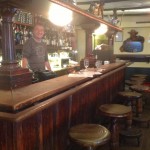
He brought my food, then, and I sat there and munched it. Delicious enough. And he directed me to the restroom in the back, when I asked. No fee for that, other than the food. No way I’m ever gonna pay good money to open a restroom door. I paid the man, then, and tipped him three or four francs. He seemed pleased (All the servers in Europe seemed very pleased when you tipped them). We chatted some more. He wished me well on my quest as I walked out. Thank you, I said.
I walked along the brick streets, back toward the river. And I knew it was time to quit walking aimlessly, and strategize. Otherwise, I’d never find the plaque. I stood on the sidewalks and looked around. Someone, somewhere could help me. But who? No one in the crowds. People in Zurich have never heard of Felix Manz. I don’t blame them. Why should they have? But I needed someone, someone to tell me where to go. I kept walking along. And there it was, on my right. A small travel office. They should know. Gripping my messenger bag, I pushed open the door and walked in. A small room with two desks. A young woman sat at the right corner, an older guy at the desk on the left. The woman looked up as I entered. I smiled at her. And I spoke to her in English.
I’m looking for a plaque along the river, for Felix Manz. I’m from the Wiedertaufer. He was a founder. I can’t find it. Have you heard of it? She seemed intrigued. No, she hadn’t heard of it. Can you google it for me? I asked. Felix Manz. Look on Wikepedia. She chattered to the older guy off to the left. In German, I think, but it was so fast I can’t be sure. And she clicked around on her computer. “Yes, here it is, on Wikepedia,” she said. Another burst of German back and forth between her and her coworker. “Yes, we have found it,” she told me. “He will show you.” And the guy got up, held open the door for me, and we walked out. “Over there,” he said in broken English, pointing. “Across the river, way down there, by that red house with the green cupola. It’s somewhere close to that place.”
I thanked him profusely. And I walked. Down the street, across the bridge. The red house loomed. And there was a little wooden walkway, leading back. I’d missed it. It was in that stretch I’d bypassed, when the streets looped around to those old town shops. I crossed the walkway. And walked back into a little grove of trees, back to the river. And there it was. The plaque. This was the spot where Felix Manz was drowned for his faith. I stood there, almost in disbelief. I had found it. I was here.
This was a story I’d been told all my life. And it was so real, right there. This is where it happened, what they told me. Here is where they brought him, bound on a wagon. Here is where they tied him to a pole and took him out on the waters on a boat. For that dreaded “third baptism”, drowning. And right out there is probably where they submerged him. There he spoke his last words, “Into thy hands, O God, I commend my spirit.” I looked around. Here is where the crowds edged in, watching. Somewhere here is where his mother stood, calling for him to stay steadfast. In death. She called that to him, even though it meant that she’d watch her son drown before her eyes. This was the spot, where all that happened.
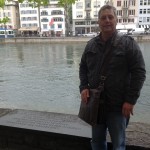
It was a powerful and moving moment. I stood there, and sat there on the wall, for more than half an hour. And then, at the end, I hailed an older guy, strolling by. Hey, can you speak English? He couldn’t, so we talked in German. Well, somehow we communicated. I need someone to take a pic with my iPad, I told him in rough German, with lots of motions. You just touch this button, real light, right here. He seemed a little grumpy. Can’t he take a quiet walk along the river without some tourist harassing him? But he obliged. I thanked him.
And then it was time to head back to the train station. I strolled along, no longer tired, almost lighthearted. I had seen what I came to see, here in Zurich. I walked into the station and reclaimed my luggage from the evil locker. You ripped me off, I thought. Wicked town, this is. I’m heading out. And I won’t see you until next Saturday morning, when I leave.
Fribourg. That’s where I was heading. The night before, on my iPad, I had reserved a room in that city. The Hotel de Faucon. Real close to the train station, the website had claimed. So I booked a room, even though it all sounded real French to me. And I was going to Fribourg, why? Because it was the closest city to the only contacts I had in Switzerland. Well, the only contacts that knew I was coming and reached out to me.
The Raboud family lives in a little village, just a short train ride from Fribourg. French speaking. On a farm that has been in the family for generations. I got to know a few members of that family, because they were friends with Anne Marie Zook. And back when Anne Marie was trudging through her four-year battle with brain cancer, they sent over some help. Anne Marie was almost like a member of their family. She had stayed with them, years ago, for a year, working as an Au Pair. They never forgot each other, the Rabouds and Anne Marie. And they came to help, two of their girls. Severine and Carline. I got to know them both when they were here. And we all got along just fine.
Just that close, I didn’t even bother to contact them. Who wants to be pestered by a guy traveling through? I thought. It puts people on the spot, makes them feel obligated. I knew Severine had just gotten married a few months ago. And Carline was in nursing school, full time. That’s busy, right there. But still, I decided to send them both a message. So I did. Hey, I’m traveling through Switzerland for a week. Any chance we could meet for a meal, or even just coffee? They both responded. Sure. Plan on stopping by.
And then, about a week before I left, a message arrived from Carline. She had adjusted her work schedule as a nurse intern, and she would be free to show me around for a day or two, if I wanted. Of course, yes, I wrote back. And thanks so much. That’s way more than I expected. I appreciate it.
I boarded a train for Fribourg late that afternoon, and soon the evil little city of Zurich receded behind me. A two hour ride later, I got off. Walked out the front entrance. People swarmed about. Now where was that hotel? The Hotel de Faucon? I had no clue, only an address. And the only people loafing about were a couple of taxi drivers lounging by their cabs. Probably not a good idea, to ask them. Where’s a bus driver, when you need him? I had no choice, I figured. So I approached. Showed them my paper with the address. Can you tell me how to get to this hotel? The website said it’s only four or five blocks.
They were tough old Frenchmen, both of them. Well, at least they claimed to speak only French. They looked at my paper and chattered between themselves. Then the older guy pointed, away. “That store, way over there, you walk there, then turn right. And then you go right again, then left. It’s a few blocks down from there,” he claimed in very broken English. The other guy pointed and chattered in French. This is all getting way too complicated, I thought. I looked at my bags. I sure didn’t want to drag them around on some fruitless chase. All right, I said. Take me. The older guy, the one who could speak a little English, jumped to oblige. Loaded my stuff in the back. And off we went, around the block and around again. It didn’t take long to get there. He pulled up in front of the old hotel and unloaded my bags. “Ten francs,” he said. I paid him and thanked him.
On then, into the hotel. A narrow little sliver of a place, five stories high. My room was on the third floor. The clerk couldn’t speak a word of English, either, or pretended she couldn’t. Somehow we communicated with hand signals. After settling in my room, I decided to go for a walk, back toward the train station. And sure enough, right at four blocks away, around a little curve, there it was. Pretty much a straight shot. The taxi guys knew that. They just wouldn’t tell me. I couldn’t get that irritated at them, though. That’s what taxi guys do. Scare up fares when there are none. On the way back to the hotel, I stopped at a nice little pub. All French. That’s what they spoke, which was gibberish to me. I finally showed the nice barmaid what I wanted by pointing to a sandwich and a beer on the menu. She smiled and gave me great service and delicious food.
Back at the hotel, I messaged Carline. Hey, I’m here in Fribourg, at the Hotel de Faucon. I’ll meet you at your station in your village tomorrow around nine. She messaged back, to my huge relief. Don’t move. I’ll stop by the hotel tomorrow morning, and we can travel to Bern from there on the train. Great. This was working out.
At nine the next morning, I waited in the small lobby. And in she walked. I would have recognized her, I think. Hadn’t seen her in probably two years, during that awful stretch when Anne Marie was sinking in her final valiant fight. Carline smiled at me in welcome. I got up and greeted her. Thanks so much for taking the time, I said. I can’t tell you how much I appreciate it. “Oh, I wanted to, it’s no problem,” she said. “Let me talk to the clerk. We can leave your bags here, and pick them up when we get back. You’re staying out with us on the farm tonight, and tomorrow night, too, if you want.” She turned to the clerk and the two of them chattered in French. The clerk smiled. “Of course.” She opened the door to the back, and I wheeled in my luggage. Cool, how things work out if you can actually communicate, I thought. We walked out onto the street and I walked into two of the most amazing days on the whole trip.
After showing me parts of old town Fribourg from high on a hill, Carline was ready to take me to Bern. The Capital of Switzerland. We walked back to the train station, and I just relaxed. I had a native born guide. No worries. After the short ride over to Bern, we walked the streets of the old town. Carline showed me the state buildings, where the legislature worked. She told me stories of Swiss history. And on and on we walked, past hundreds of old shops. Down to the river, where the famous Bern bears are kept in a natural preserve. We dropped by the big old pub nearby for a beer, sat there and looked out, watching the bears. Carline told me stories of what it’s like, to live in Switzerland. About the nursing program she was enrolled in. I was pretty impressed. She is twenty years old, and fluent in three languages. French, German and English. And she’s working her way through a tough nursing program. European education, I got to thinking, is the real stuff. A lot harder than back home, from what I was hearing. Soon we headed back uptown. Stopped to eat at a nice outdoor café. Europe has a lot of those. Outdoor cafes, neat little places right out on the sidewalks. And then we walked some more, browsed through an outdoor market, and then back to the train station. We stopped at Fribourg to pick up my bags, then headed on out to the village where Carline had parked her little car. And off we zoomed. We had one more stop, yet, before heading out to the farm.
Carline said her pastor and his wife wanted to meet me. They lived in a nearby village. I’d be honored, I said. And we pulled up to a very nice house in a development. Swiss houses are built to last hundreds of years, same as German houses. We walked up to the front door. A kindly-looking elderly man answered. He greeted Carline and shook my hand and welcomed me. “Come in, come in, and sit a while,” he said. We walked to the back patio and sat there to visit. The pastor’s name was Jean-Pierre Trachsel, and he smiled at me with a crinkled face and twinkling eyes. “Severine gave me her copy of your book,” he told me. “And I just finished reading it. I couldn’t put it down. It reminded me of some of the things I faced back in my youth.” I thanked him. That was cool, indeed. He knew where I was coming from before I even got here. Then he continued. “I’ve checked out your blog, too. Interesting. I see you’re a post- millenialist?” Oh, boy, I thought. Now we’re going to get into some trouble, here. I’m sure he doesn’t agree with my eschatology. But the man smiled his crinkled smile. His eyes still twinkled. And we just sat there and talked about a lot of things. I felt completely welcome and at home.
And he told me. He was a retired businessman and the pastor of a small, independent church, Alliance Pierres Vivantes (APV, translated Alliance Living Stones). That’s a fairly rare thing in Switzerland, an independent church. The state churches claim everyone at birth. And if you branch off on your own, into your own little group, they call that group a sect. It’s a negative connotation, I took it. People who belong to sects are all pretty much lumped together, in the public’s mind. Doesn’t matter what you claim to believe. You’ll be classed with the looniest of elements out there. And your children, too, they make fun of them in public schools. The teachers do that, make fun of little children whose parents belong to a sect. I grappled with that. Back home, there is no state sponsored religion that taxes you. Back home, it’s pretty much a smorgasboard of choices. Any little group is free to pop up and start a church, and nobody even blinks twice. Not so, here, apparently.
And as we talked, I told Jean-Pierre. I came to Switzerland to see two things. Places that mean a lot to my people, the Anabaptists. One of those was in Zurich, by the river, where they drowned Felix Manz. The other place is not far from here. Trachselwald Castle, in the Emmental area. It’s a place where they imprisoned and killed Anabaptists, a long time ago. And it’s important for me to get there. He smiled, intrigued. “And how are you getting there?” he asked. I grinned at him. Don’t know, I said. I just figured the Lord would bring someone along to guide me. Can you take me?
And he smiled some more, at my little trap. His eyes kept twinkling. “Yes, I will take you,” he said. “We’ll go tomorrow. I’m retired. I have the time. Plus, I’m very interested in your story, and the things you came to see.” Thank you, I said gratefully. Thank you. And there it was. My ride to Trachselwald Castle. They had told me back home. The train wouldn’t get me there. It’s too remote. You’ll have to rent a car, or something. And I had really said what I’d claimed to Jean-Pierre. Guess I’m just going to have to figure that God will bring someone along to show me. I had no idea of the little church Carline and her family attended. Had no concept of what a “sect” was in Switzerland.
We chatted right along for a while. Carline and Jean-Pierre’s wife Yvonne sat off to one side, visiting. And Jean-Pierre told me. “We have church service every Tuesday evening. That’s tonight.” Carline had told me before, and I figured I’d go, even though they’d sing and speak in French. Jean-Pierre, though, had a further request. “Would you say a few words tonight? Speak a bit, about where you come from, and maybe a few words to our youth, too? They have a tough road sometimes, being so different from outside society. It would be good if you spoke a bit about your journey and where you are now.” Ah, man, I thought. Bless his heart. He really wants me to speak. I don’t speak much in front of church groups, I said. Never have. I don’t know how comfortable I’d be. Or if I even knew what to say. “Well, consider it,” he responded. “Give us ten or fifteen minutes. Carline can translate for you.”
All right, I will, I said. Consider it, I mean. I’ll probably do it. I don’t know how long I’ll last up there, though. What could I say? The man was taking me to Trachselwald Castle tomorrow, and all he wanted was for me to speak a few words to his congregation. I don’t think I told him, because I didn’t know him well enough. But I thought it. I’ve always shied away from giving my official “testimony” to any captive church audience. In that setting, they expect you to be over the top cheerful and upbeat. Say what you’re expected to say, about all your victories. Which is fine. But anyone can claim anything. And often, “testimonies” are just not realistic. Life is life, and we live it flawed. It’s foolish, to pretend we don’t. It’s probably that quiet reserved Amish blood in me, but I think the most powerful testimonies out there are lived and seen, not spoken and heard.
Carline and I left soon, then, and headed on over to her home farm in a nearby village. A real, honest-to-goodness working Swiss farm. A generation or so ago, the family lived in the house that was attached to the barn, the old way, she told me. Her parents had built a free standing home decades ago. The men were out in the fields, frantically baling hay. It had been wet for a long time, and more showers were coming tonight. They had to get the hay in. A quick tour of the place. They raise beef cattle. We walked through the barn which housed the cattle. Various sizes, in different groups. We walked into the house and met her mother, a very kind lady who welcomed me. She spoke only French, though, so Carline had to translate. Then it was off to unpack at her brother-in-law and sister’s home a quarter mile down the road. They had an empty room upstairs with a mattress on the floor. That’s where I’d sleep. I dragged up my bags and freshened up a bit. Then walked back down to the farm. There, I met Severine, the other sister I knew, and her husband Daniel. Severine smiled and greeted me. The last time we saw each other was at my friend Paul Zook’s home, a couple of years back.
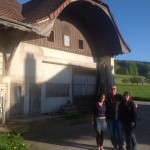
From left, Carline, me, and Severine, just before heading to church.
And then it was time to head to church. Carline told me she sometimes sings with the band, but not tonight, probably. She was a little nervous about translating for me. She’d not done that before, in front of her church group. Others in the group were more talented than she was, she thought. Don’t worry, you’ll be fine, I said. I’m the one who’s nervous, here. After a fifteen minute ride or so, we approached the church building in a little village. Nice, clean building. “It was a restaurant, once,” Carline said. “When that closed down a few years ago, our church group bought it.” We walked in and sat up front, on the first bench. The band was strumming up. Jean-Pierre had told me they were considered charismatic, the people in his group, and they probably are, in ways I did not see that night. But the music I heard was pretty much mainstream evangelical.
After a few songs, Jean-Pierre got up front and greeted his flock and opened with a prayer. And then he began his introduction. It lasted a good five minutes or more. Carline translated quietly to me as the man spoke. “In our history, we have a dark blot many don’t know of,” he said. “There was a group of people among us who were persecuted and killed by both Catholics and Protestants alike. The Wiedertaufer. These people were hunted relentlessly, and in time they fled, mostly to America. Tonight we have one of their descendants with us. Ira Wagler, who came from the Amish. And he will speak a few words to us.” He motioned cheerfully at me. And I got up and walked to the podium, Carline close behind me. We both had hand-held mics. And I lifted mine to speak.
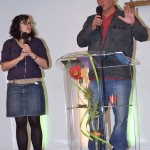
Me and my interpreter.
It was the first time in my life that I spoke to any group through an interpreter. And it actually was pretty cool. I said a few sentences, then stopped. Carline translated. While she spoke, I had a few seconds to think of what I wanted to say next. It all worked out, I gotta say. I told them a bit of where I came from. And how I wrote my story. I held up a copy of Growing Up Amish. This book brought me to Germany, to speak at two universities. And now I’m here, in Switzerland. I came to see where the Wiedertaufer came from. I told them of my struggles, how hard it was to break away from the Amish. How I’d left and returned and left and returned, again and again. How I’d finally found peace through faith in Christ. To these people, that wasn’t gibberish. They understood. And I told the youth. You are free. Free to walk in love, free to move forward in the world around you. I can’t imagine how hard it is for you, sometimes, because your world is strange to me. As are the pressures you face. But you are free. Walk free.
I actually lasted fifteen minutes, I think. Or close to it. Maybe twelve. Then I thanked them, and we returned to our seats. After the service, many people walked up and welcomed me. Many could speak only French, but they welcomed me in their language. Afterward, Carline and another nice lady took me downstairs for a tour of their private school. These people have their own school, which is almost an impossibility in Switzerland. Somehow, they had obtained permission. And they paid whatever costs associated with running it, too. Cheerfully. I was very impressed. If these people were a sect, they were a sect I could identify with. They really were. I signed my copy of Growing Up Amish and donated it to the school library.
The next morning, after a few cups of coffee in the kitchen with Carline and her Mom, I was ready when Jean-Pierre pulled in with his SUV. Ready and excited. He seemed excited, too. He had mapped out our route to the castle. And, he said, he’d done a little research, too. “Your Mom is a Yoder,” he said. “I can take you through the area today, where the Yoders come from.” I’d like that a lot, I said. And then we took off. We picked up right where we’d left off the day before, talking. We agreed on a lot of things, except for end-times stuff. He lost me, there, with his beliefs. And I lost him, with mine, I’m sure. But it was OK. I am free, I told him. I just live. Because I am free to live. He told me of how it was, to be a preacher for a “sect” group. It’s inconceivable, what you’re telling me, I said. Back home, you wouldn’t even get a second glance. There are thousands and thousands of churches very similar to yours. And we can have our own schools, too, and do. I marvel that your group has its own. From what you’re telling me, it really is a miracle.
After more than an hour, we approached the Emmental area. Where the Castle was. Historically, it was a poor area, Jean-Pierre told me. Which is probably why some people there were attracted to the Anabaptist faith, way back. It’s a faith for poor people. And I felt the excitement stirring inside me. Not the nervous excitement of Muenster. But a more settled, almost peaceful feeling. I was approaching a place that reflected the stories I’d always heard. Stories of persecution, blood and death. They did this to my people. The “real” Anabaptists, as my father would say. And we drove around, through a town, then a back road out. And there it stood, on a hill, right where it has stood for hundreds of years. I pointed. There. That has to be it. Trachselwald Castle. Off to a side road then, and then the winding entrance. Up and up we drove. And then we pulled in and parked.
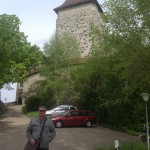
Approaching the castle tower.
It’s a small castle, as castles go. Remote. And it would be pretty much completely unknown to the world, except for one thing. The descendents of the Wiedertaufer flock here in droves. One by one, as I was coming, and in large and small groups. This place has huge historical significance to them, to me. Here, in this tower, here is where it happened. Where the authorities rounded up and imprisoned innocent Anabaptist farmers from the surrounding area. And tortured and killed them. All because of their faith. A faith they refused to recant. Who can even imagine what kind of strength and courage that took? To stand up to power and refuse to yield, even when it costs you everything? We like to think we could imagine that. But it’s impossible, if you haven’t actually seen and felt that kind of persecution. And they come here by the hundreds, those descendents, on a pilgrimage of sorts. And they enter the tower. Walk up to the floors where the cells are. And they write their names there, on the fronts of the old wooden cells. Their names and the date. Hundreds and hundreds of names are written there. I figured to add my own. We walked up the hill into the courtyard.
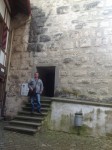
The tower entrance.
We approached the tower and entered. And up the steep old rickety stairs to the second floor. Then the third. Jean-Pierre recognized what this moment meant to me, and he respected it. We talked in hushed tones. Here are shackles, on the wall. And up here, on this floor, are cells. And up on the next floor, too. He took my iPad and quietly snapped pictures of those moments. And I took a black marker from my messenger bag and wrote my name on the wooden cell wall. I was here. Along with hundreds and hundreds of others who had been. I would tell of it, I said to Jean-Pierre. This place is almost a holy place, because it harbors so much of the story of who they were, those poor Anabaptist farmers. And who we are, their descendents. They were tortured here. They died here.
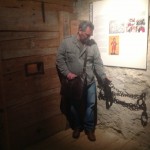
Shackles.
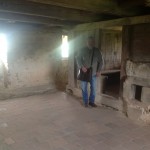
A cell on the fourth and final floor of the tower.
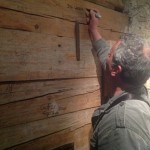

Jean-Pierre quietly absorbed the place, right along with me. He really did. He sensed the deep ancestral call inside me, and honored it. I could not have asked for a better guide or companion.
We left then, and headed out into the hills on two-lane highways. “This is where the Yoders come from,” Jean-Pierre told me. And we just chatted right along. It was past noon, and he kept looking out for a café. We passed a few in little villages, but strangely, they were closed. Jean-Pierre mumbled. We backtracked, then, and came up on a café that was open. We sat outside and checked out the menu. The waitress approached. Jean-Pierre looked at me inquisitively. “Will you have a beer with your meal?” he asked. Of course, I said. He smiled and ordered one for himself. “The Americans seem so hung up on alcohol,” he said. “It’s OK to be divorced four times, but you better not have a drink.” I laughed. And before I could say it, he said it for me, his eyes twinkling. “You just live, right?” Yep, I said. I just live. My heart is free. I just live.
We headed back to the farm, then, and Jean-Pierre told me a lot of stories of the places we passed. Old stories, history, that the Swiss know about their land. I thanked him over and over for taking me. For spending a good part of his day and time, just showing me a place I wanted to see so badly. He smiled his crinkled smile. “It was my pleasure,” he assured me. “I send my greetings to your people.”
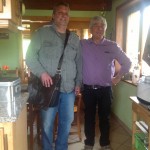
Jean-Pierre, my friend.
At the farm, my day was far from over. Severine, Carline’s sister, and her husband Daniel were waiting for me. They wanted to take me to a few places. And in the next three hours, we toured a cheese-making plant and a chocolate factory. It was all so much, coming at me so fast. And then we returned to the farm, where supper was waiting. Afterward, I sat there and visited with Carline’s parents, Jacques and Marie-Anne. Carline translated, and back and forth we talked. I signed a copy of my book to the family and gave it to them. Thank you, I said. Thank you so much for your hospitality. They smiled and invited me to stop by anytime I returned to Switzerland. They meant it, too.
We sat around the table then, and Carline helped me map out my trip for the next day. I had decided to head to Geneva, then up a ways close to the pass through the Alps. I’d stay tomorrow night in Brig, a little town in the foothills. We checked out a few hotels and I booked a room for the next night. And Carline asked me. “Do you want me to check your flight details for Saturday morning?” Nope, I’m good, I said. I have the itinerary right here. It’s all scheduled. I’m leaving Zurich at 1:30 PM. And right there, at the table at that moment, I made my biggest mistake on the whole trip. Right there. The door was open. All I had to do was walk through it. But there’s no way I could have known that, because you don’t know what you don’t know, until you do. And looking back, you can always pinpoint the instant it could have gone either way, right when it happened.
The next morning around 9:30, Carline dropped me off at the train station in a nearby village. She walked me to my train, told me to stay on it, all the way to Geneva. Straight run, no layovers. We hugged good-bye, and I thanked her again. And she boarded her own train back to Fribourg, and her nursing studies. A minute later, my train slid out. To Geneva, then, and the Reformation Museum. The Rabouds had told me of it. It’s worth seeing. A steady drizzle was coming down as I stored my bags in a very reasonably priced locker at the Geneva station, and took off to find the Museum.
After a few misguided directions from strangers, one of them actually knew what he was talking about. “The old town,” he said, and pointed. “It’s over there in the old town, beside the old cathedral.” And I tramped off in the rain. Seems like about all I did in Switzerland was walk. And walk and walk.
I found the Museum, and walked through it. Gaped at the displays. Actual letters written and signed by Calvin and Luther. Those two giants in history and theology. I stood there, in the presence of what they had actually touched and produced, and marveled. I could have spent a lot of time there. But I had to keep moving.
I stayed that night in Brig. Most of the week, the weather was cloudy. And on the ride that day, I never got to see the peaks of the Alps. Or on the next day’s ride through Interlaken. Unbelievably beautiful scenery. The peaks were always obscured by clouds and rain. But the land is beautiful in Switzerland, no matter what the weather.
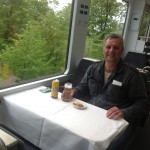
A beer on the ride through Interlaken.
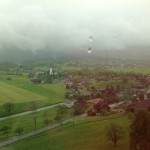
Swiss countryside from the train.
I was getting pretty comfortable, just hopping around on the train on my own, by myself. Figures, I thought. Now I’m at least a novice at this. And tomorrow I have to leave. I stayed that last night in a hotel in a village outside Zurich, the other direction from last time. I enjoyed a leisurely evening. Slept pretty solidly through the night. And boarded the train the next morning, for Zurich and the airport. All in good time. I was getting there way early. Who knows how long it would take, to work your way through that maze?
It was a pretty sizable airport. I was surprised at how big it was. It took me a while to locate the British Air counter. There were no crowds. Good. I was early. I walked up to one of the two perfectly coifed ladies sitting there and showed her my eTicket. And she asked for my passport. She took it from my hand and scanned it. “I’m not finding you,” she said. No alarm bells went off, not right that instant. She’d find me. I was in there.
The alarm bells clattered a few seconds later, though, in my head. She looked perturbed, all of a sudden. “This is not good,” she muttered. And she turned to me. “That flight has already boarded. And left the gate. Let me just check on that.” She dialed a number, and there was a staccato conversation. “The plane has left, or is just leaving,” she said.
They had changed the departure time, from my original itinerary. I’ll just say that it was all one big shock. I’d been walking along pretty much unscathed, for the whole trip. To the point where I expected nothing else. And now, this. Getting a grip on reality in an instant like that is a little tough to do. Instinctively, I grasped the first straw. Can’t you get me on another flight? I do have a ticket, here. A negative shake of her head, instantly. “It’s a holiday weekend,” she said. “The flights are all filled. Air France can take you, but they’re so expensive.” I just stood there and gaped. And she continued. “Up there around that aisle, over there. There’s a discount ticket seller. They broker. Check with them. It’ll be cheaper than Air France.”
I don’t know why I didn’t just step back and think a bit. Look it over, the situation. I should have. I knew enough to. But I didn’t. All I wanted was to get out of there, out of that evil city and that evil airport. To them, those two perfectly coiffed ladies, I was just a hapless traveler. A guy who had missed his plane. They owed me nothing. And they conveyed that quite convincingly. The one thing they didn’t think of, this guy has a voice to the world. A small voice, sure. But a voice nonetheless. And I will never fly British Air again, unless there is no better option. They really don’t care a whit about you. They’ll leave you stranded, as they left me. The cost to the customer means nothing to them. They’ll leave you stranded and alone in strange and evil cities. They will. It means nothing to them, to accommodate a traveler who missed his flight. Nothing. And British Air means nothing to me. I don’t know how they even survive, with customer service like that. In a truly free market, they never would.
I walked up to the discount counter. The elderly, heavy-set lady with glasses was amazingly cheerful and polite. I told her what had happened. Can you get me on a flight, any flight, to Philadelphia? She jabbed at her keyboard. “The computer’s slow today, very slow,” she said apologetically. And then she pulled up a few flights. And she frowned. “They’re so expensive, those one-way tickets,” she said. Don’t worry about one-way, I told her. Just find the cheapest price. Go roundtrip, if that’s less. And she punched around some more, then smiled. “Yes, I have one seat on a Swiss Air flight to JFK in New York,” she said. And she told me the price. I’ll take it, I said. The miracle was that there was even one seat available, looking back. And the price could have been way worse. Let’s just say all those Euros I got from Sabrina went out the window, whoosh, just like that.
And I’ve thought about it all a lot since that moment. It was just a little sliver of the story of the trip. One of those incidents that pops up, now and then, to balance things out a bit. But the lesson was not karma. Not things evening out, word for word and bad for good. This bump barely registered as a tiny blip, when you really weigh it out against all the blessings that had rained down on me, and I’d come to expect. Nah. It’s not karma. The lesson was respect. The laborer is worthy of his hire. Respect what you earn. And when someone like Dr. Sabrina Voeltz pays you to speak at her University, you don’t speak lightly of that. You respect it. You accept it gratefully as a gift. But you respect it. Because if you don’t, it will be taken from you in the end, right when you least expect it. That’s not the only way of looking at it all, I know. But it sure is one way.
The Swiss flight was good, except I was just so tense, all through those eight hours. The flight orator showed up, one row forward, one seat left. She howled intermittently, but persistently, all the way over. An infant, maybe a year old. I felt sorry for the little girl and her mother, who got up and paced the aisles again and again, trying to comfort her terrified child. I thought I had stress. It was nothing, compared to that mother’s.
And late that night, after a good bit of drama trying to contact my friend who was planning to pick me up in Philly, but instead was diverted to JFK, after a lot of drama involving all that, I got home. Very late. And very grateful to be there. But so tense that I sat at my computer until I drifted off way after midnight. It was good to be back, back in my familiar old surroundings. It really was. It was a great feeling, to have traveled safely far away and back to where I’d started from. Home.
And I’m thinking I’d really like to travel back to all those places again one day.
**********************************************************
I’ve mentioned it before, I think. I never bother my contacts in the publishing world much. Once in awhile, maybe, but it’s pretty rare. And it’s always a little startling when an email pops in from anyone in that world. (I’m like, gah, what’d I do now, go off on too much of a rant somewhere?) And I was startled last week to see an email from Carol Traver of Tyndale, who I’ve quietly worshiped from afar these past few years. Because she’s the only person who stepped out from that vast and desolate wilderness any writer must slog through to be found. She’s the only one who saw a glimpse of what I had to say and stepped out and took a chance and offered me a real shot at my dream. And a few days before the second anniversary of my book’s release, she was just checking in, she said. And, oh yeah, she wanted to tell me. Growing Up Amish had just crossed over into a new place. Print units have now reached 70,000 in sales.
I wrote back and thanked her. And we just chatted back and forth a bit. And I asked her. What’s the total number of combined sales, from eBook and print units? I told Dad it was right at 140,000. I didn’t know if it was that high or not. I haven’t heard anything lately. And she shot me back the numbers. 70,000 print units. And 90,000 eBook units. A total of 160,000. And they’re still selling, still moving right along, she told me. Wow, I thought. And I wrote back. 160K rocks. Thanks for your time and thanks for checking in.
And thanks to all of you, my readers, for your time, too. And thanks for checking in again. 160K really does rock. Thanks for reading my stuff. I am grateful. I don’t know what else to say.
Share















